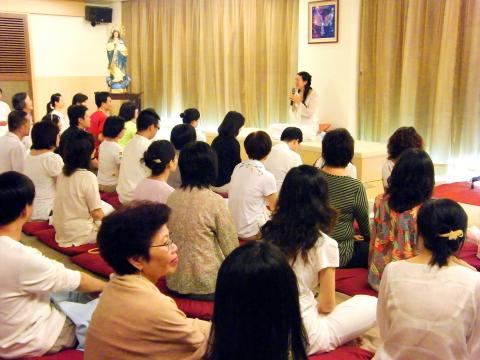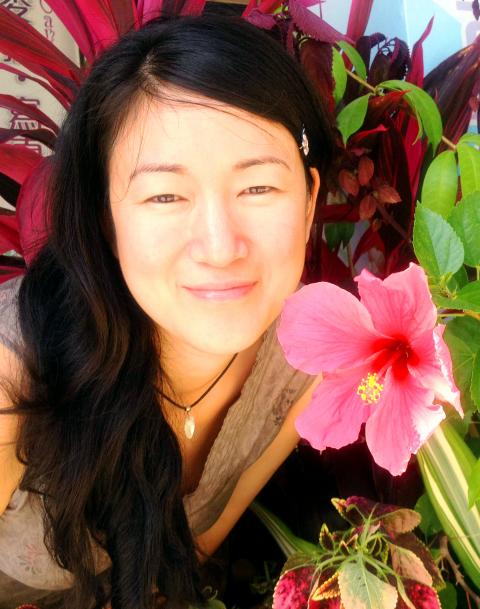Nowadays, those seeking an alternative to mainstream religion face a dizzying array of options. Visiting Taiwanese-Canadian author and healer Amira Eva Loo has tried many of them on a 13-year journey seeking enlightenment that included a 6-year stint spending over half of each year meditating in India, and experiences with everything from karma to Christ to a clairvoyant.
Amira, currently in Taiwan to hold book signings, talks and “healing” retreats, was one of the first to bring the “Oneness method” to Taiwan. The method teaches people how to use guided meditation and deeksha to achieve enlightenment through a connection with the divine. Today, there are over 25 Oneness centers where people experience deeksha (which claims to help transfer the divine through the laying on of hands).
But she has now branched out into her own independent practice that involves deep guided meditation that claims to help people delve deeply into their subconscious and deal with family issues, personal pain and even the trauma of past lives.

Photo Courtesy of Amira eva loo
No pain, no gain
She believes the key is “pure conscious attention at the center of oneself.”
“If one can pay attention to any pain, disturbing emotion or negativity,” she said, “it would eventually dissolve. If one can go beyond thoughts and stay centered in awareness, awakening would result … because any phenomena that is witnessed simply transforms into something higher.”

Photo Courtesy of Amira eva loo
Her book, Awakening into Love, published this year and available at Eslite bookstores, is the portrait of a woman at once uplifted and beaten down by her spiritual transformation, constantly struggling for true enlightenment while eventually dealing with the pragmatic difficulties of opening and running the business side of a spiritual center.
After meeting a guru named Sri Bhagavan at the Oneness University in India in January 2004, she took a series of workshops and learned deeksha.
The descriptions of her early experiences can seem outlandish to the skeptical — more like a trip on a psychedelic drug like LSD or DMT.
“When people take drugs, part of the brain opens up and you get a heightened sense of awareness,” she said. “With spirituality we’re doing it in a natural way, that merging into one that you see in Buddhist texts, the cosmic consciousness.”
Following the advice of her guru she and her partner began to introduce the method in Taiwan, resorting at one point to going door to door and from 7-Eleven to 7-Eleven, talking to anyone who would listen. After a humbling experience where only a dozen people attended a function meant to host 250, she got a break when a visiting meditation teacher introduced her to his followers at a large event, which enabled her to make the necessary connections to continue.
Divine intervention
She took groups of people from Taiwan to India to learn the deeksha training and become practitioners. She opened the first Oneness center in Taiwan in Taoyuan in the spring of 2004. After soliciting funds from friends and relatives the group moved to a bigger center in Taipei in the fall of that year.
“It helped me to know myself, to see all the past I hide or am unwilling to admit,” said Sandy Lee (李舒蘋), a former student who is now also a spiritual teacher “[I was] able to face relationships, truly from the heart to forgive myself, accept myself and others.”
“Most people live on a very surface level of their consciousness,” said Amira. “And that’s why they don’t feel a lot of pain and think they are fine — they occupy only one part of their consciousness. But every once in a while the shit starts to seep upstairs through the vents. Freedom is being able to go into any area of consciousness and feel at peace and in harmony with every aspect of the self: anger, fear, joy, happiness and embrace the whole of the human experience.”
Some of her methods seem similar to forms of therapy including regression and Gestalt. The difference is a firm belief in a divine force. “It’s a form of deep meditation, guiding one to go into subconscious and unconscious layers. I don’t want to re-traumatize but release the emotional charge until you are at peace,” Amira said. “In psychological work it goes on for years. In my work the belief in the divine and grace can lead to a divine intervention and can heal within one session.”
Too good to be true?
The idea of a quick fix is problematic for some. A former student, Leiven Hwang (黃立文) was initially intrigued. “What was suggested was the possibility of the deeksha blessing being a potential source of instantaneous enlightenment; it sounded like a pretty cool thing to try,” he said. “The initial experiences were very powerful in terms of almost every aspect of being. In addition it brought different kinds of revelations about things in my life I wasn’t seeing and wanted to transform.”
He quit because he no longer “felt impelled by the work” as “delving into my own conditions and suffering, self-discovery and learning my own path” became more rewarding. “Amira may say her work helps process all those sufferings in a faster, more compressed and efficient way, but I felt like doing the work myself — I get much more out of the process.”
There can be benefits to her methods, Hwang said. “[There is] definitely the possibility for people to be in much more improved states, to be more happy. At the same time my belief is that the more we are looking at our inner state and evaluating what is better or worse, the act of making those judgments and not being able to accept where we are at is a barrier to be being able to be liberated.”
Other students have said the process helped them to become more self-aware, and according to former student Carol Chen (陳純甄) it “let the wisdom flow from the inner fog” so you can “accept and love yourself as well as [form] a link with God.”
Event Info
Amira’s upcoming book-signing events are in Taipei Friday, Oct. 19 from 6:45pm to 9:30pm at the Tien Cultural Foundation (耕莘文教基金會), 22 Hsinhai Rd Sec 1, Taipei (台北市辛亥路一段22號). Admission: NT$300, includes a copy of Awakening into Love
Kaohsiung: Saturday, Oct. 20 from 2pm to 4:30pm at 288 Zhisheng Rd, Zuoying District (高雄市左營區至聖路288號). Admission: Free
Taipei: Friday, Oct. 26 from 7:30pm to 9:30pm at the Eslite Xinyi Store (誠品信義店), 11 Songgao Rd, Taipei City (台北市松高路11號). Admission: Free
Taichung: Friday, Nov. 2 from 7pm to 9pm at the Taichung Dadun Cultural Center (台中市大墩文化中心演講廳) 600 Yingcai Rd, West District, Taichung City (台中市西區英才路600號)
There will also be a four-day Advanced Healing and Light Worker Training from Nov. 8 to Nov. 11, and a 15-day Awakening Consciousness Retreat in Nature from Dec. 1 to Dec. 15. For information on the book signings, training, or retreat, go to: www.amiraevaloo.com or www.onenesscenter.com.tw. All events are held in Mandarin.

April 28 to May 4 During the Japanese colonial era, a city’s “first” high school typically served Japanese students, while Taiwanese attended the “second” high school. Only in Taichung was this reversed. That’s because when Taichung First High School opened its doors on May 1, 1915 to serve Taiwanese students who were previously barred from secondary education, it was the only high school in town. Former principal Hideo Azukisawa threatened to quit when the government in 1922 attempted to transfer the “first” designation to a new local high school for Japanese students, leading to this unusual situation. Prior to the Taichung First

Chinese Nationalist Party (KMT) Chairman Eric Chu (朱立倫) hatched a bold plan to charge forward and seize the initiative when he held a protest in front of the Taipei City Prosecutors’ Office. Though risky, because illegal, its success would help tackle at least six problems facing both himself and the KMT. What he did not see coming was Taipei Mayor Chiang Wan-an (將萬安) tripping him up out of the gate. In spite of Chu being the most consequential and successful KMT chairman since the early 2010s — arguably saving the party from financial ruin and restoring its electoral viability —

The Ministry of Education last month proposed a nationwide ban on mobile devices in schools, aiming to curb concerns over student phone addiction. Under the revised regulation, which will take effect in August, teachers and schools will be required to collect mobile devices — including phones, laptops and wearables devices — for safekeeping during school hours, unless they are being used for educational purposes. For Chang Fong-ching (張鳳琴), the ban will have a positive impact. “It’s a good move,” says the professor in the department of

Article 2 of the Additional Articles of the Constitution of the Republic of China (中華民國憲法增修條文) stipulates that upon a vote of no confidence in the premier, the president can dissolve the legislature within 10 days. If the legislature is dissolved, a new legislative election must be held within 60 days, and the legislators’ terms will then be reckoned from that election. Two weeks ago Taipei Mayor Chiang Wan-an (蔣萬安) of the Chinese Nationalist Party (KMT) proposed that the legislature hold a vote of no confidence in the premier and dare the president to dissolve the legislature. The legislature is currently controlled